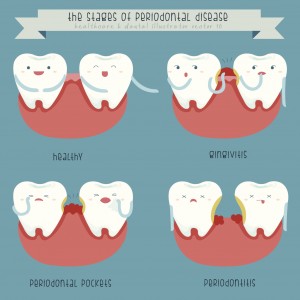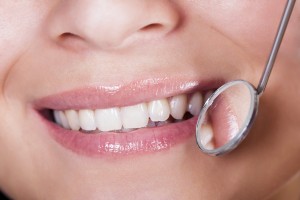 Gum disease is an inflammation of the gums and is caused primarily by the bacteria found in plaque. If you didn’t already know, plaque is a colorless film that constantly forms on your teeth. The more often you brush your teeth, the less time that plaque has to build-up on your teeth and the lower your risk is for gum disease. If, however, you let plaque buildup by not brushing and flossing every day, the bacteria can end up infecting your gums, teeth and eventually, the tissue and bone that support your teeth. The result? A severely infected tooth that has to be removed by a dentist, or in worse cases of infection, the tooth may fall off on its own.
Gum disease is an inflammation of the gums and is caused primarily by the bacteria found in plaque. If you didn’t already know, plaque is a colorless film that constantly forms on your teeth. The more often you brush your teeth, the less time that plaque has to build-up on your teeth and the lower your risk is for gum disease. If, however, you let plaque buildup by not brushing and flossing every day, the bacteria can end up infecting your gums, teeth and eventually, the tissue and bone that support your teeth. The result? A severely infected tooth that has to be removed by a dentist, or in worse cases of infection, the tooth may fall off on its own.
There are three stages of gum disease and these are:
- Gingivitis. This is the earliest stage of gum disease and is also when the inflammation of the gums are evident, mainly due to plaque buildup at the gumline. The resulting infection also causes the gums to bleed as well, which you may notice when you’re flossing or brushing your teeth. It is important to note that gingivitis is still reversible, but only through proper dental care and by observing proper oral hygiene at home.
- Periodontitis. At this stage, the damage is usually already irreversible. There may also form pockets below your gum line, which can trap food and plaque and make your condition much worse. Frequent visits to the dentist and improved oral care at home is important to help prevent further damage to the teeth and gums.
- Advanced Periodontitis. This is the final stage of gum disease and is where the infection has not only affected, but has already destroyed the fibers and bone supporting your teeth. This can result into your teeth shifting or being loose, which can severely affect your bite and eventually cause tooth loss. At this stage, aggressive and constant periodontal treatment is the only way to save the infected teeth and gums. Although treatment is not always enough and the infected teeth may already be beyond saving.
How Do You Treat Gum Disease?
Gingivitis, as mentioned earlier, can still be reversed via proper brushing and flossing. Rinsing with mouthwash isn’t necessary, but will still help. If you take proper care of your teeth and gums, you’ll prevent plaque from building up in your mouth and prevent, or even reverse, gum disease.
If, however, you have failed to take proper care of your teeth and let plaque buildup and let it harden to become tartar, your only option is to go to a dentist for a professional cleaning. The only way to remove tartar that’s found above and below your gum line is to scale your teeth. If scaling isn’t enough, a root planing procedure may be necessary. This is a procedure that will help smooth out any irregularities on the roots of your teeth to help prevent plaque buildup in the future.
As early as today, make the necessary changes to your oral hygiene and take better care of your teeth. Brush your teeth at least twice a day, floss once and rinse with mouthwash, preferably one that’s prescribed to you by your dentist. If you do all these, and visit your dentist regularly, you significantly lower your risk for gum disease. Also, in the off chance that you do have gum disease, you increase the chances your dentist catching and treating the infection before it spreads and causes serious damage to your teeth and gums.

